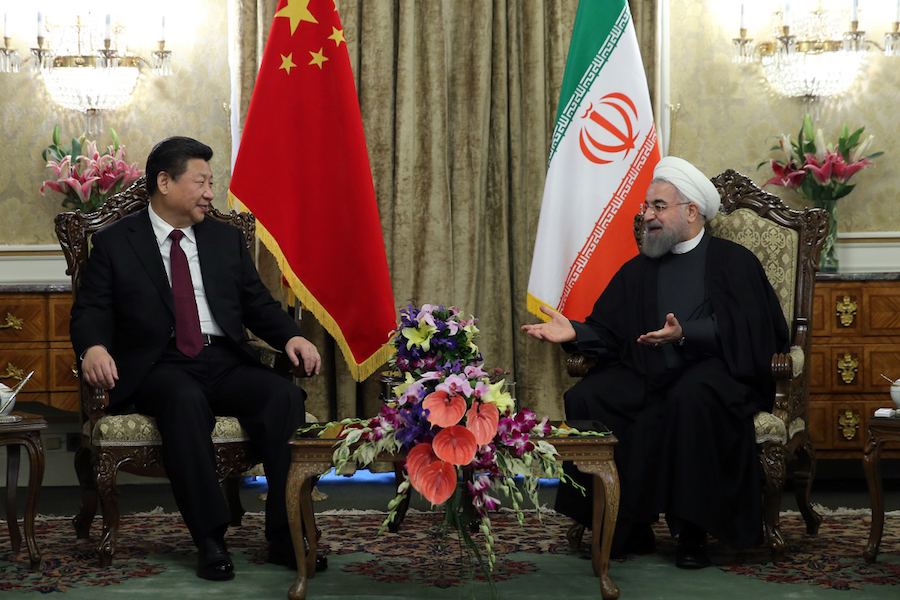Iran-China deal’s repercussions for the region
https://arab.news/jtate

It seems that China has found a new partner in the form of Iran — so much so that the two countries have drafted an extremely important economic and security partnership agreement that may pave the way for billions of dollars of Chinese investments to flow into the energy sector and other industries within Iran. This would undermine the efforts of US President Donald Trump to impose isolation on the Iranian government because of its nuclear and military ambitions.
The proposed partnership, which was detailed in an 18-page agreement obtained by The New York Times, would expand the Chinese presence in the sectors of banking, telecommunications, ports, railways and dozens of other projects. In return, China will receive regular supplies, according to an Iranian official and another person involved in the oil industry, which will significantly reduce the value of Iranian oil over the next 25 years.
The document also refers to the deepening of military cooperation between the two countries, which may allow Beijing to build a stronghold in a region that has been a strategic concern of the US for decades. The document calls for holding joint military exercises and cooperation. According to a report on the Oil Price website, Iranian Supreme Leader Ali Khamenei this month agreed to the addition of another element that would change the balance of geopolitical forces in the Middle East: Full military and air cooperation between Iran and China, with Russia also playing a major role.
There is a meeting scheduled for the second week of August between Iranian government, military and intelligence officials and their Chinese and Russian counterparts to discuss the remaining details of the agreement. Provided everything goes as planned, Chinese and Russian bombers, fighters and transport lines will have unrestricted access to Iranian airbases as of Nov. 9.
The partnership was first proposed by Chinese President Xi Jinping during his visit to Iran in 2016 and it won approval by President Hassan Rouhani’s Cabinet last month, according to Iranian Foreign Minister Mohammed Javad Zarif.
Washington and the region will view the expansion of aid, military training and intelligence sharing with Iran with concern. Indeed, US warships regularly clash with Iranian forces inside the crowded Gulf waters and defy China’s claims of eligibility for control of much of the disputed South China Sea. The National Security Strategy released by the Pentagon in 2017 declared China to be a “strategic competitor.”
The deal may allow Beijing to build a stronghold in a region that has been a strategic concern of the US for decades
Dr. Hamdan Al-Shehri
The Iran-China agreement includes proposals to allow Chinese companies to build the infrastructure for the fifth generation (5G) telecommunications networks in Iran and provide the Chinese BeiDou system for satellite navigation, along with helping the Iranian authorities impose more control over what is going on in cyberspace, similar to the “Great Firewall of China.”
This agreement had remained up in the air for a long time without anyone knowing its precise details, but the leaked draft copy testifies to the depth of the relationship between the two countries, as well as the deal’s ability to create a new reality in the region. It will greatly complicate matters and provide Iran with weapons. Tehran represents a great danger and further developing its economy is a challenge for the international community. The US has imposed sanctions in a bid to force Iran to change its behavior and stop its support for terrorist militias in the region, while the international community has shown it is keen to rein in Tehran's nuclear and ballistic missile programs, which threaten security and stability. However, China and Russia have many interests in Iran and neither is concerned with any American role in the region.
In order to understand the economic importance of this agreement, we only need to look at one very important detail: China imports 10 million barrels of oil per day to meet its industrial needs and Iran could potentially meet most its demand. The economic clause in the Sino-Iranian agreement means that the steady supply of oil at a fixed price means a lot to China, but it contradicts the policy of the US, which is seeking to achieve Iran’s collapse in its domestic arena under a suffocating economic embargo.
This is in addition to the fact that China has seemingly set itself a goal of challenging every American presence in the world. It started with a military port in Djibouti, East Africa, on the pretext of it being a logistical base for the forces fighting Somali pirates, while the Iran deal will give it a presence at the entrance to the Arabian Gulf, which means that the US will no longer be the dominant force in the strategically important Strait of Hormuz.
The question that must be answered is whether it is permissible for a country to achieve its interests by engaging with a state that supports terrorism, such as Iran. In the event that the worst happens, it might lead to a miserable new world order, not just a new Middle East based on spreading chaos and ruin.
- Dr. Hamdan Al-Shehri is a political analyst and international relations scholar. Twitter: @DrHamsheri








































